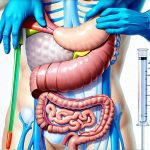Bariatric surgery represents a significant life change for individuals seeking long-term weight management and improved health. While incredibly effective for many, it fundamentally alters the gastrointestinal (GI) system, necessitating ongoing monitoring to ensure optimal nutrient absorption, identify potential complications, and maintain overall well-being. Post-operative GI symptoms are common, ranging from mild discomfort to more significant issues that can impact quality of life. Understanding which diagnostic tests are valuable in evaluating these symptoms is crucial for both patients and their healthcare teams. This article will delve into the various GI tests worth considering after bariatric surgery, explaining their purpose, what they assess, and when they might be recommended – all with the understanding that individual needs vary greatly and this information should not substitute professional medical advice.
The digestive system undergoes substantial changes following procedures like gastric bypass, sleeve gastrectomy, or adjustable banding. Reduced stomach size, altered anatomy, and potentially decreased production of digestive enzymes and hormones can all contribute to a spectrum of GI issues. Common complaints include diarrhea, constipation, bloating, gas, nausea, abdominal pain, and nutrient deficiencies. Proactive monitoring, guided by a healthcare professional, is essential for early detection and management of these concerns. It’s vital to remember that experiencing any persistent or concerning symptoms warrants discussion with your surgical team or primary care physician. This isn’t about anticipating problems; it’s about being prepared and informed to navigate the post-surgical journey effectively.
Common Post-Bariatric GI Symptoms & Initial Evaluation
Many patients experience some degree of digestive upset after bariatric surgery, and these symptoms can often be managed with dietary adjustments or over-the-counter remedies. However, when symptoms are persistent, severe, or accompanied by warning signs like significant weight loss, vomiting, or blood in the stool, further investigation is warranted. Initial evaluation usually begins with a thorough medical history review, focusing on diet, lifestyle, medication use (including supplements), and symptom characteristics. A physical examination will also be performed to assess overall health. Simple blood tests are often ordered as a first step to screen for nutrient deficiencies – particularly iron, vitamin B12, vitamin D, folate, calcium, and thiamine. These deficiencies are relatively common after bariatric surgery due to reduced food intake and altered absorption.
Beyond initial bloodwork, healthcare providers may employ stool testing to rule out infections or malabsorption issues. Stool cultures can identify bacterial or parasitic infections causing diarrhea, while fecal fat measurements assess the amount of undigested fat in the stool, indicating potential problems with fat absorption. A comprehensive metabolic panel (CMP) provides information about kidney and liver function, electrolyte balance, and glucose levels – all important parameters to monitor post-surgery. Depending on the initial findings, more specialized GI tests may then be considered to pinpoint the underlying cause of persistent symptoms. The goal is always to identify and address any issues proactively, preventing long-term complications.
Advanced Diagnostic Testing Options
When initial evaluations don’t provide a clear diagnosis, advanced testing becomes necessary. Several options are available, each with its strengths and limitations. Endoscopy (also known as esophagogastroduodenoscopy or EGD) involves inserting a thin, flexible tube with a camera into the esophagus, stomach, and duodenum to visualize these areas directly. It can help identify ulcers, inflammation, strictures, or signs of bleeding. Similarly, colonoscopy allows visualization of the entire colon and rectum, detecting polyps, tumors, or sources of bleeding. Both procedures typically require bowel preparation and sedation.
Another valuable tool is breath testing. Specifically, a lactulose breath test can assess small intestinal bacterial overgrowth (SIBO), a condition where excessive bacteria accumulate in the small intestine, leading to bloating, gas, and malabsorption. Hydrogen/methane breath tests are used to diagnose lactose or fructose intolerance. Finally, capsule endoscopy involves swallowing a tiny camera encased in a digestible capsule, which transmits images of the small intestine as it passes through the digestive tract. This is particularly useful for evaluating areas that are difficult to reach with traditional endoscopy. Choosing the appropriate test depends on the patient’s specific symptoms and clinical presentation.
Identifying Malabsorption
Malabsorption – the inability to properly absorb nutrients from food – is a common concern after bariatric surgery, especially gastric bypass. Several tests can help identify malabsorption issues:
- D-xylose absorption test: This measures the ability of the small intestine to absorb D-xylose, a sugar that doesn’t require pancreatic enzymes for digestion. Low levels suggest impaired intestinal function.
- Fat soluble vitamin testing (A, D, E, K): Blood tests can determine if levels of these vitamins are within normal range; deficiencies indicate malabsorption issues.
- Fecal elastase: Measures the amount of elastase in the stool, an enzyme produced by the pancreas. Low levels suggest pancreatic insufficiency, affecting fat and protein digestion.
It’s crucial to understand that malabsorption can stem from various factors, including inadequate stomach acid production, pancreatic insufficiency, bacterial overgrowth, or damage to the intestinal lining. Addressing the underlying cause is essential for restoring nutrient absorption. Dietary modifications, enzyme supplementation, or antibiotic therapy may be recommended based on test results and individual needs.
Evaluating Dumping Syndrome
Dumping syndrome occurs when food, especially sugary foods, moves too quickly from the stomach into the small intestine. It’s more common after gastric bypass surgery. Symptoms can include nausea, vomiting, diarrhea, abdominal cramping, dizziness, and rapid heart rate, usually occurring shortly after eating (early dumping) or 1-3 hours later (late dumping). Diagnosing dumping syndrome relies heavily on a patient’s reported symptoms and dietary history.
- Glucose tolerance test: While not specific to dumping syndrome, it can help assess how quickly glucose is absorbed into the bloodstream, potentially supporting the diagnosis.
- Dietary challenge: A controlled trial of different foods can help identify trigger foods and determine the severity of symptoms. This often involves keeping a detailed food diary and monitoring for symptom onset after consuming specific items.
Management primarily focuses on dietary modifications: limiting sugary foods, eating small frequent meals, separating liquids from solids, and avoiding high-fat foods. The key is to slow down gastric emptying and prevent rapid fluctuations in blood sugar.
Investigating Persistent Nausea & Vomiting
Persistent nausea and vomiting post-bariatric surgery can be debilitating. Several causes should be investigated:
- Gastric outlet obstruction: Blockage at the end of the stomach, often due to scarring or narrowing. This can be evaluated with an upper GI series (a type of X-ray) or endoscopy.
- Stomal stenosis: Narrowing of the stoma (the connection between the stomach and small intestine in gastric bypass surgery). Endoscopy is the primary diagnostic tool.
- Gastroparesis: Delayed stomach emptying, which can be caused by nerve damage or medication side effects. A gastric emptying study measures how quickly food leaves the stomach.
Treatment varies depending on the underlying cause but may include dietary changes, prokinetic medications (to speed up stomach emptying), or in some cases, endoscopic dilation to widen a narrowed stoma. It’s critical to rule out dehydration and electrolyte imbalances associated with persistent vomiting. If you are recovering from GI cancer surgery, it is vital to stay hydrated.
For those who have undergone bariatric surgery, understanding these symptoms and tests can be empowering. Often, patients will wonder if gut issues are normal after surgery. It’s important to remember that proactive care is key, especially for children experiencing GI pain. When reintroducing foods, consider following guidelines for a pediatric GI flare and how to reintroduce fiber. Understanding the role of surgery in GI cancer treatment can also help patients navigate post-operative care.
The information provided here is intended for general knowledge and informational purposes only, and does not constitute medical advice. It is essential to consult with a qualified healthcare professional for any health concerns or before making any decisions related to your health or treatment.


















